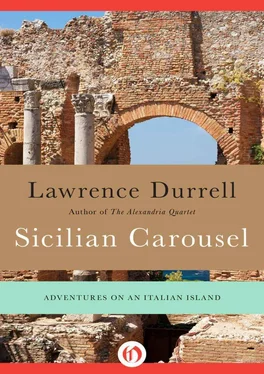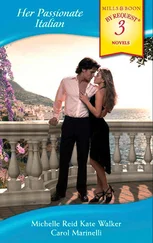There was no time to go down to the sea for we were due in Agrigento that evening, so that after Gela we tumbled back into the bus and set off along the coastal road — the section leading us to Agrigento struck me as desolate and full of dirty sand dunes; even melancholy, if you like, but not melancholy and depressing as some of the later stretches after Marsala. Perhaps it was the anticipation of the Vale of the Temples which lay ahead, or simply the sun made one drowsy and content to feel the ancient pulse beat of the vanished Gela where now, off the coast, strange steel animals with long legs probed about like herons in a shallow lake. An idea came to me, and I jotted it down in order to chew it over later at leisure. (Before Christianity the sources of power were in magic, after it in money.) What is to be done? Nothing, it is too late.
On a remote country road, in the deep dust, we unexpectedly drew to a halt under a great carob tree full of fruit, which is known as the locust bean. There was an enclosure with trees and a wicket gate behind which one could see a trimly laid out little cemetery. This little halt had been organized specifically for Deeds by Roberto. It was a war cemetery which came into his purlieu for inspection. Accordingly he somewhat apologetically took himself off in the direction of the British and Canadian graves, lighting a cigarette and promising us not to be long. Roberto turned us loose in the road and we straggled about for a while like lost sheep. I walked a little way and entered a vineyard where I found a patch of grass, almost burned brown by the summer heat. Here I lay down in its warm crackling cradle, dislodging swarms of crickets which hardly ceased their whirring as they retreated. The earth smelled delicious, baked to a cinder. Ants crawled over my face. In my heat-hazed mind dim thoughts and dreams and half-remembered conversations jumbled themselves together as a background to this throbbing summer afternoon with the cicadas fiddling away like mad in the trees. Every time a light patch of high cloud covered the sun the whole of nature fell silent — or at least the crickets did. Did they think that winter had suddenly returned? And when the heat was turned on again was I wrong to detect in their fervor a tremendous relief that such was not the case? I hovered on the edge of sleep and then called myself to attention, for the others did not know where I was and it would not do to miss the bus or keep poor Mario fretting and scowling by being late.
I hoisted myself sleepily to my feet and crossed the field back to the road where Roberto, who had been trying to explain something about the carob tree to the rest of the party, had run into vocabulary trouble. Here I could help a little, for these great strong carob trees were a handsome feature of Cyprus with their long curving bean. When wind or lightning broke a branch of the tree one was always surprised to see that the wood revealed was the color of human flesh. The locust bean, Roberto was trying to explain, was highly nutritious. He was picking a few — they were dry and snapped between his teeth — and handing them round for the party to try. We had often done this on picnics in the past and I was pleased once more to make the acquaintance of this noble tree whose produce is “kibbled” (an absurd word) very extensively in Cyprus for animal fodder. By now Deeds had sauntered back to us in time to take the long seed in his fingers and try it with his teeth. “Can I bore you with a story?” he asked diffidently. “Some of the boys in that cemetery came from a commando I trained in Cyprus. Now among our training tips was to keep an eye wide open for carobs if short of food. You can live almost indefinitely on carob seed and water, and for a commando in this theater it was most essential gen. In fact several of those men were lost between the lines during the first assault for about ten days, without rations of any sort. But they found fresh springs and they found locust beans and lived to tell the tale. Alas, they were killed later in a counter-attack. But if we had been training a commando in the U.K. we would have forgotten about the nutritive qualities of the carob. I always think of Cyprus in those days when I inspect this little cemetery.” He had been quite a time and seemed a trifle sad, and somewhat glad to pile back into the bus with us and start off again down the long roads which led onwards to Agrigento and the Temples which for Martine (and not ruling out Taormina) had been the great Sicilian experience. So, on we sped now, eating carobs.
The land had gone yellower and more ochreous; the valleys had become longer and more spacious. It had a feel of wildness. But there were strings of lorries loaded with dust-producing chemicals which floated off into the air and powdered the bus until Mario swore and shook his fist at them. Somewhere some Herculean constructions were being mounted — I hoped it was not Agrigento which had come under the scourge of urbanization. On one of these long declines we slowed down for an accident involving a lorry and a large sports car. A very definitive accident for the sports car with its occupant still in it had been pushed right into the ditch on one side, while the lorry responsible for the push had itself subsided like an old camel into the ditch on the opposite side. As in all scenes of terror and dismay everything seemed to have settled into a sort of timeless tableau. The police had not yet arrived. Someone had covered the form of the lorry driver with a strip of sacking — just a bare foot sticking out.
But the occupant of the sports car was a handsome blond youth, and he was lying back in his seat as if replete with content, with sunlight, with wine. The expression on his face was one of benign calm, of beatitude. He wore a blue shirt open at the throat. There was no disorder in his dress, nor was he marked by the collision; he seemed as if asleep. The light wind ruffled a strand of blond hair on his forehead to complete the illusion of life, but the little man whose stethoscope was planted inside his blue shirt over the heart, was shaking his head and making the traditional grimace of doctors the world over. The front of the sports car, the whole engine, was crumpled up like a paper bag. Yet there was no blood, no disorder; the young man had simply ceded to the demands of fate. It was a death by pure concussion. He lay, as if in his coffin, while around him stood a group of half a dozen peasants who might have been chosen by a dramatist to give point and resonance to this classical accident in which so unexpectedly death had asserted itself. No one cried or beat his breast; the women had drawn the corner of their head shawls into their mouths and held them between white firm teeth — as if by this gesture to allay the possibility of tears. Two peasants, with mattocks held lightly in hands wrinkled as ancient tortoises, stared at the young man and his sumptuous car as one might stare (the operative phrase is perhaps “drink in”) at a holy painting above an altar. Their black eyes brimmed with incomprehension. They did not try to understand this phenomenon — a dead boy in a brilliantly colored car with yellow suede upholstery. But there was no sorrow, no breast beating, no frantic curiosity such as there would have been in the north or in Greece. Nobody crossed themselves. They simply stared, without curiosity, indeed with a kind of stern bravado. You felt that they and death were equals. It was simply that the island had struck home once more. This was Sicily! And one realized that even death had a different, a particularly Sicilian resonance. The groups of black eyes remained fixed and unwinking whereas the Greek or Italian eye is forever darting about, restless as a fly. In the background there was an older man with a mane of white hair, who stared as hard as the others — indeed with such concentration that his little pink tongue tip stuck out and gave him an absurdly childish expression. But no fear.
Читать дальше











